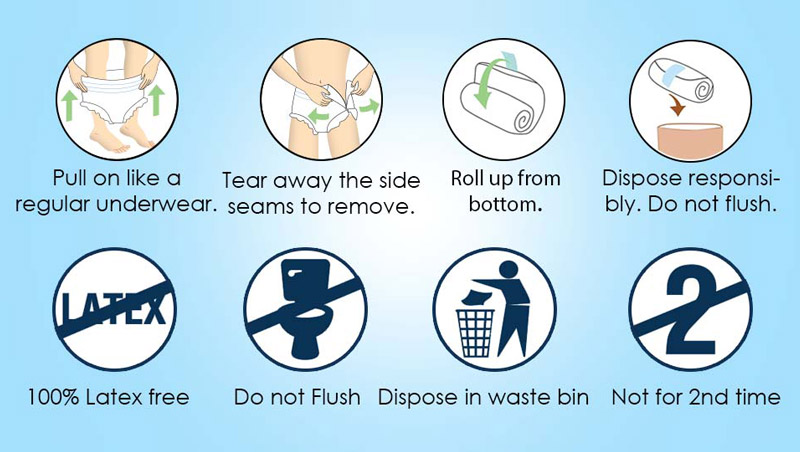21 Jul, 2025

Adult diapers are the essential aids for individuals managing incontinence or mobility challenges, and they get to enjoy comfort, hygiene, as well as dignity. Since its inception as a first-generation adult diaper manufacturer, Nikhar Hygiene Industries has focused on the provision of quality products and user and caregiver education on hygienic storage and safe disposal. It not just ensures product effectiveness but also addresses environmental and sanitation issues, especially in diverse environments like India, whose waste management issues are diverse in urban and rural situations.
Why Does Proper Storage and Disposal Matter?
Proper storage ensures the absorbency, hygiene, and utility of adult diapers. The improper storage may result in the degradation of materials, diminished performance, or irritation of the skin. Similarly, unprofessional disposal may cause sanitation problems, perpetuate environmental pollution, and increase the inconvenience of accessing areas with minimal waste management facilities. In India, where resident homes are not usually fitted with medical waste containers and rural systems for disposing of waste are sometimes below par, public health and conservation of the environment rely on accountable behaviour.
Best Adult Diaper Storage Practices
To maintain the diaper quality, keep them in a dry, air-conditioned place away from humid spaces and heating sources. Humidity prevalent in Indian dwellings because of monsoon seasons or oceanic environments leads to deterioration of absorbency as well as fabric quality. Avoid storing them in humid areas such as bathrooms or kitchens and choose a cupboard, shelf, or storeroom with proper ventilation. Uniform temperatures avoid adhesive fading and help the product to deliver consistent performance.
The first packaging of adult diapers is intended to protect them from dust, moisture, and contaminants. If a package has been opened, move unused diapers to a new, closed, clean container for storage with proper hygiene. In India, where there is abundant dust and contaminants, this is particularly necessary, as open storage areas tend to have dust and contaminants within, especially in city homes or rural regions with poor infrastructure.
UV rays or direct sunlight can soften diaper material, thereby losing absorbency and comfort. Keep diapers out of windows or outside, a typical issue in Indian households where space is provided for sun-drying laundry in verandas. Diaper storage in shaded, covered spaces promises longer use.
In caregiving situations, easily accessible diapers are essential, particularly in case of emergencies. Keep diapers by size, category, or absorbency in easily visible containers or shelves. This helps in Indian households where multiple caregivers may be involved so that it could be executed efficiently and is less taxing.
Best Practices for Disposing Adult Diapers
Fold the diaper up tightly with soiled side in after use, and secure by using the sticky tabs. Dispose of them in a leak-proof, odor-resistant bag to prevent spills and smells. In India, where medical waste bins are not generally found in homes, heavy-duty or biodegradable plastic bags can be used to hold waste until it is possible to dispose.
Dispose of soiled diapers in an appropriate, lined waste container with a tight lid to manage odours and keep it clean. In urban Indian homes, where there is regular municipal waste collection, have bins emptied on a frequent basis. In rural settings, where collection is infrequent or unavailable, place sealed bags in a secure, temporary holding space outside of dwelling space until collection or disposal is possible.
Laws regarding the disposal of waste are variable in India. In urban areas, the municipalities may provide special instructions for separate collection of hygiene waste from organic or recyclable waste. In rural areas, with the limited availability of formal waste collection, consult local health authorities. Burning diapers is not recommended, as it produces hazardous toxins, a common but risky activity in some rural settings. Instead, organize with neighbourhood waste collection agencies or community dumps, where available.
Flushing any part of an adult diaper, such as liners or pads, can block plumbing lines and contaminate water sources, a dilemma in India’s often-overburdened sewage systems.. Diapers are neither reusable nor recyclable due to their complex material composition. In rural India, where open dumping is common, incorrect disposal would lead to polluted water and soil with resulting health hazards. Always select safe containment and correct waste streams.
Overcoming India-Specific Challenges
Absence of medical waste bins in Indian households hinders disposal. Urban residents often rely on regular garbage bins, and rural dwellers also suffer due to poor waste collection facilities. Caregivers can use low-cost, lidded bins for convenient onsite storage. Decentralized efforts in the form of central collection points can facilitate proper treatment of hygiene waste in rural areas. Raising the environmental awareness and promoting better waste facilities is a significant move in the right direction.
Conclusion
Safe disposal and storage of adult diapers are critical to hygiene, user comfort, and preventing environmental devastation. Storing diapers in cool, dry, and clean areas, and disposing of them in accordance with local guidelines, helps users and the caregivers in maintaining dignity and safety. In India, the solutions to the problems of inadequate medical waste bins and rural disposal have to be practical and area-centric. Nikhar Hygiene Industries stays loyal to its customers by providing quality products and advice for sustainable use and making a cleaner and healthier world for everyone.
21 Jul, 2025